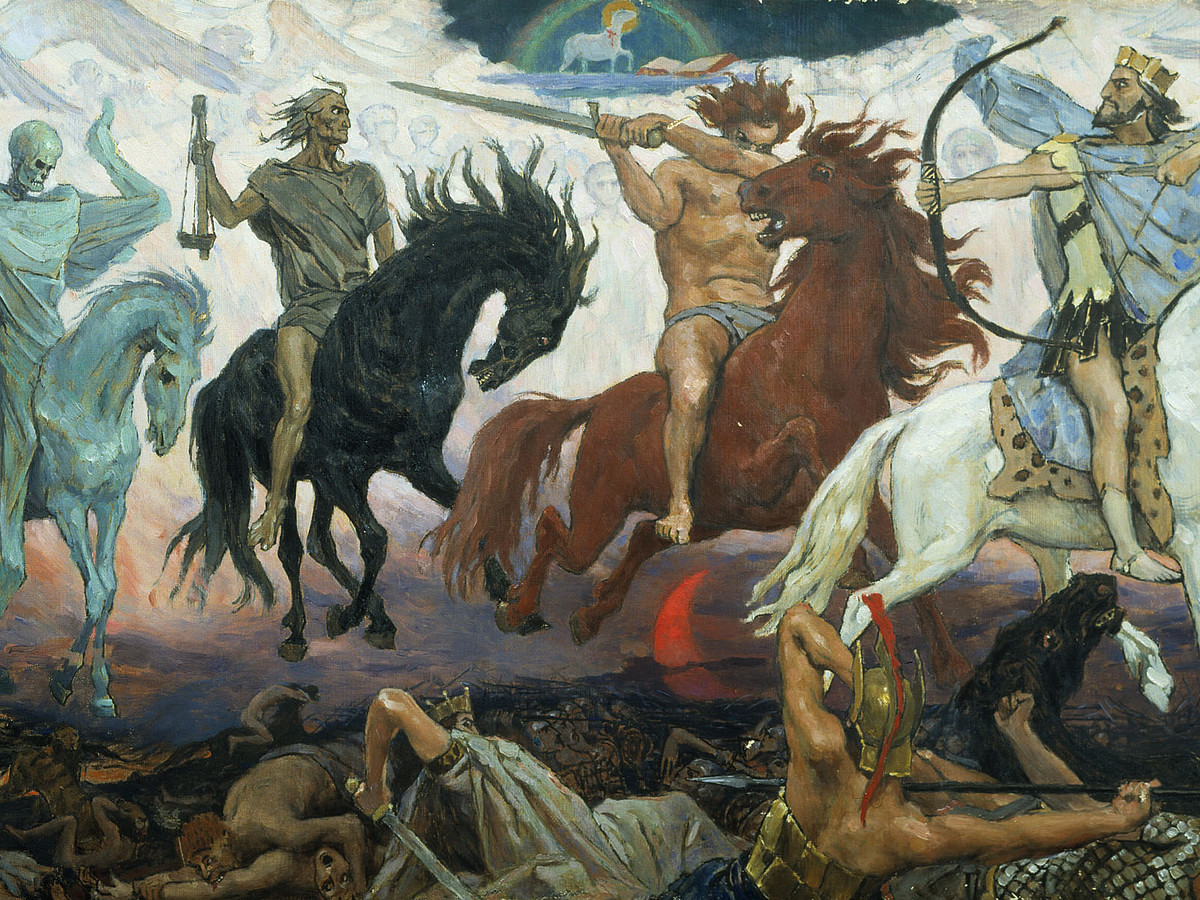The book of
Revelation or Apocalypse certainly qualifies as one of the ‘hard things’ of
the Bible. But don't leave! I promise, we can make some sense of it.
Revelation is full of prophecies and symbolism. That shouldn’t
surprise anyone: Revelation tells you, right at the beginning, that it was
written in symbolism:
Rev. 1:1 “The Revelation of Jesus Christ,
which God gave Him to show His servants the things which must shortly take
place. And He sent it and he symbolized it when he sent by his Angel to his Servant John.”
The Greek word rendered 'symbolized' can also be translated as 'signified' or 'in or with signs'.
As we pointed out in part 1 of this series, opinions are a dime a dozen... everybody has them, and they all have the same value: zero. The only way to know for sure that your understanding of a hard Bible passage is on the mark is to compare it to other parts of the Bible. So that’s how we’re going to go about this.
Before we get
to the individual symbols, we need to understand when to look for these
signs or symbols. Does Revelation answer that?
Rev. 1:10 “In the Spirit I found myself present on the day of the Lord.”
John’s use of the term “Day
of the Lord” did not mean Sunday, despite some really bad translations that render it that way. Sunday didn’t have any special
significance until
hundreds of years after John died and even then, it was part of
Catholicism’s attempt to overwrite pagan ideas.
But there are other
biblical references to a
special future “day” of the Lord.
Revelation 1:10 uses the Greek word "en". The first definition of
en is ‘in’, not ‘on’... John's visions happened "in the Lord's day", not 'on the Lord's day'. What's the difference? When we are being specific we say ‘on such and such a
day’, but when we are referring to a time period, we say “in”: ‘In my
grandfather’s day’, for example. The Bible does the same:
“Just as the days of Noah were, so the presence
of the Son of man will be. For as they were in those days before the Flood,
eating and drinking, men marrying and women being given in marriage, until the
day
that Noah entered into the ark, and they took no note until the Flood came and
swept them all away, so the presence of the Son of man will be.” (Matthew
24:37-39)
So in Revelation 1:10, because it says "in", not "on", 'the Lord's day’ means a time period, not a single day. What time period, then, did John mean by "the Lord's day"?
In the passage just quoted, Matthew 24:37, Jesus refers
to that time period of the last days preceding the Flood as a parallel to his future presence.
(By the way, if your Bible says “coming” instead of “presence” in these
passages in Matthew, you need to get a better Bible. The Greek word in all these places is
parousia, from which we get our
English word “presence”... It even has a P, an R, and an S, just like “presence.”
The Greek word for “coming” is erkhomenon;
and the fact that the root part of that word ‘khom’ sounds a lot like the
English word “coming” is not an accident, either.)
Jesus' often warned of a future day of reckoning.
“Many will say to me in that day: ‘Lord, Lord...” (Matthew 7:22)
“Just as lightning flashes from one part of heaven to another part of heaven, so the Son of man will be in his day.” (Luke 17:24) Note the parallel account in Matthew: “Just as the lightning comes out of the east and shines over to the west, so the presence of the Son of man will be.” (Matthew 24:27)
“Just as lightning flashes from one part of heaven to another part of heaven, so the Son of man will be in his day.” (Luke 17:24) Note the parallel account in Matthew: “Just as the lightning comes out of the east and shines over to the west, so the presence of the Son of man will be.” (Matthew 24:27)
So when John
says that in some spirit-assisted way he found himself ‘in the Lord’s day’, it
is reasonable that he was speaking about seeing visions of Jesus' future presence... some future,
pre-Armageddon period of time.
If further proof is needed, John’s description of the ‘horsemen of the apocalypse’
in Revelation chapter 6 includes war, famine and pestilence – the same signs
Jesus told his apostles, in Matthew 24, would mark the period called 'the last days'.
What has
confused some readers of the Revelation account is that the first horse out of the gate is the white
horse, and his rider is armed with a bow, given a crown, and described as heading
toward a conquest.
People want to equate that picture with Armageddon, but it
almost seems backwards. After all, if the white horse and the crowned rider refer to the 'thy kingdom come' we've all prayed for, why is it immediately followed by war, famine and
pestilence? Billy Graham even went so far as to claim that the rider on the
white horse couldn’t possibly mean the establishment of Jesus’ kingdom; It had
to represent some false kingdom.
He and
several other Bible commentators, however, are leaning on their own interpretation instead of using the Bible to understand the Bible. (Continues below...)
If you're struggling to support your pioneer lifestyle, maybe this will help: "99 Ways to Fire Your Boss" is a huge collection of income ideas, plus powerful suggestions for lowering your cost of living! Look for it on Amazon.com in paper and electronic versions.
Matthew 24 is undeniably discussing the same events as pictured by the horsemen of Revelation 6. Matthew 24:3 reads: "The disciples came near to him by himself, saying, `Tell us, when shall these be? and what is the sign of thy presence, and of the full end of the age?'"
The answer Jesus gave was that his presence would be characterized
by many bad things that would begin happening
on Earth. So yes, the
establishment of Jesus’ kingdom - the beginning of the ride of the white horse - doesn’t happen at Armageddon. It happens prior to, and then is immediately followed
by bad things, rising to the
crescendo of Armageddon.
Another
vision within Revelation makes exactly the same point:
“War broke out in heaven: Michael and his angels
battled with the dragon, and the dragon and its angels battled but they did not
prevail, nor was a place found for them any longer in heaven. So down the great
dragon was hurled... On this account be glad, you heavens and you who
reside in them! Woe for the earth and for the sea, because the Devil has come
down to you, having great anger, knowing that he has a short period of time.” (Revelation
12:7-12)
Again, we see
a reference to a period of time,
marked by ‘woe for the earth’, that precedes the climax that will spell the end
for Satan.
Of course,
there’s way too much to the book of Revelation to discuss in a short article
like this one. In coming discussions we’ll deal with some of the individual
symbols, characters, beasts, and numbers.
Please feel free to Share this, leave a comment, and subscribe. Click here for Part Four of this series.




